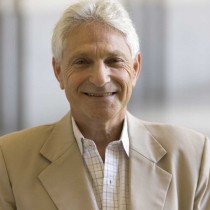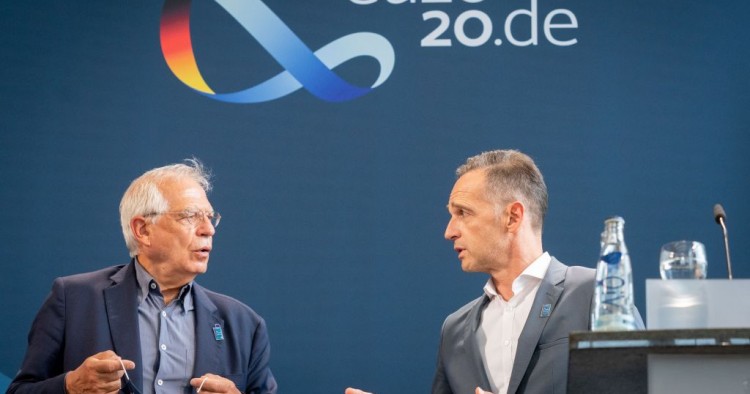This week's briefing on recent news and upcoming events in the region featuring Emiliano Alessandri, Randa Slim, and Mark A. Heller.
Eastern Mediterranean tensions reach a boiling point
Emiliano Alessandri
MEI Scholar

Simmering eastern Mediterranean tensions are reaching a boiling point as competing claims over offshore natural gas resources risk escalating into open international confrontation. Unhelpful unilateral policies pursued by coastal states have been increasingly buttressed by military moves exacerbating the danger of incidents at sea, signally between NATO allies Greece and Turkey, an EU member and an EU accession candidate respectively.
After adopting mild punitive measures last year — including a reduction of Turkey’s pre-accession funds — the EU is now discussing more drastic actions, from targeted sanctions to broader retaliatory measures, aimed at curbing what European governments see as continuing illegal Turkish activities off the coasts of EU member Cyprus and in the proximity of Greek islands where contested gas fields lie.
While Ankara’s intransigence has unified and hardened the EU position, bringing the bloc to the verge of one of its most consequential foreign policy decisions, a plurality of voices — from the EU’s High Representative for Foreign Affairs and Security Policy Josep Borrell to German leaders holding the presidency of the Council of the EU — continue to call for diplomacy to prevail. These voices should be heeded because any possible short-term results deriving from a more combative EU stance would need to be balanced against the long-term consequences of further EU-Turkey estrangement.
The alternative to sanctions or similar measures that would only lead to painful confrontation with no assurance of a major reversal in Turkish policy is a more robust diplomatic initiative demanding a cessation of Turkey’s ongoing activities as a condition for a balanced negotiated solution that delivers dividends for all parties involved.
Sensible EU policy must be based on the recognition that by virtue of its geography and regional weight Turkey cannot be kept from controlling a commensurate share of eastern Mediterranean gas. Realism should also suggest that Ankara would continue to push a similar definition of its national interests under a different government.
At the same time, it should by now be clear to Turkish elites that further intransigence will only lead to greater regional containment as evidenced, among other counter-initiatives, by the recent maritime border deal between Greece and Egypt. Ankara should further recognize that the type of military activism displayed in Syria and Libya would be most dangerous in an eastern Mediterranean context in which the U.S. continues to play a role despite its diminished regional influence and where EU and NATO stakes are real and high.
The only viable way out is, therefore, to bring energy cooperation back into the equation of a resurrected EU-Turkey dialogue, which, like in the past, leverages the unavoidability of EU-Turkey economic interdependence toward mutually advantageous — and as lofty as possible — strategic goals.
Nearly a month on from the Beirut blast and no sign of change in Lebanon
Randa Slim
Senior Fellow, Director of Conflict Resolution and Track II Dialogues program

Nearly a month after the explosion at the Port of Beirut, the investigation led by the military police is dragging on with no report of results yet. Signs suggest that Lebanon’s rulers are manipulating the investigation to deflect any responsibility for the criminal act. The longer it goes on, the more likely Lebanese are to blame the leadership of the army for failing to conduct a transparent investigation, thus tarnishing the reputation of the only remaining trustworthy national institution. An international fact-finding commission involving Lebanese and international investigators is needed not only to achieve justice for the victims and accountability for this criminal act, but also to help the Lebanese army not be perceived as participating in a cover-up of the decisions made by successive governments since 2014 that led to the explosion on Aug. 4.
Ahead of French President Emmanuel Macron’s second visit to Beirut since the blast, originally scheduled for the celebration on Sept. 1 of the centenary of the creation of modern-day Lebanon under a French mandate, the country’s political oligarchs nominated Dr. Mustafa Adib, currently serving as Lebanon’s ambassador to Germany, to be the next prime minister. The process by which Dr. Adib was selected smacks of business-as-usual as if a blast that claimed the lives of more than 180 people, wounded more than 6,000, and destroyed a major part of the country’s capital and a significant part of its cultural heritage, was not sufficient to force a change to the status quo.
President Macron wants to be that change agent. During his last visit to Beirut on Aug. 6, he proposed the idea of a new political contract to replace Lebanon’s sectarian political system, the foundation of which was laid by France 100 years ago. While President Michel Aoun, Speaker of Parliament Nabih Berri, and Hezbollah Secretary-General Hassan Nasrallah paid lip service to President Macron’s proposal, it is about as likely to be implemented and lead to a change in the entrenched political system as the UN-convened Syrian Constitutional Committee is to agree on amendments that will change the behavior of the Syrian regime. In both cases, the political system has proven itself able to withstand internal and external pressure for change.
Flight to Abu Dhabi
Mark A. Heller
Non-resident Scholar

On Monday morning, an El Al aircraft took off from Tel Aviv and flew directly across northern Saudi Arabia to Abu Dhabi. On board was a delegation of Israeli officials who will discuss with their Emirati counterparts a broad range of financial, economic, technological, agricultural, and public health issues. Several senior Americans, led by President Donald Trump’s adviser and son-in-law, Jared Kushner, and his national security adviser, Robert O’Brien, are escorting the Israelis.
This first flight by an Israeli flag-carrier marks a further intensification of the interaction between the two states. It follows the official revocation of the UAE’s participation in the Arab economic boycott of Israel, and both countries will benefit materially from this development. However, the highly visible American involvement in a triangular relationship, though still important because of the UAE’s interest in advanced American military technology and its desire to lock in the gains of this breakthrough in advance of a possible Democrat victory in the November elections, is not really about deepening the Israel-UAE tie. Instead, it is about incorporating other Arab countries into its logic. Only in that way can the U.S. turn the change represented by the Israel-UAE breakthrough into a self-sustaining regional dynamic.
Whether, and to what extent, the US succeeds in this effort will not be apparent from anything that actually happens on the ground in Abu Dhabi. Instead, answers have begun to emerge even before the El Al plane lands in Abu Dhabi but they will take on real shape only after the visit there ends, the Israelis go home, and the Americans move on to other destinations in the region.
The arrival time in Abu Dhabi is important because it is a function of the flight path. A flight of three hours means that permission was granted for the aircraft to fly though Saudi airspace, a significant gesture given both the longstanding refusal to allow overflights by Israeli aircraft en route to India and East Asia and Saudi reticence about the Israel-UAE agreement. The concession can almost certainly be attributed to American involvement but it may well be interpreted as a signal of future Saudi intentions with respect to Israel that could encourage other candidates for rapprochement to follow suit.
The days immediately following the original announcement of the Israel-UAE agreement were rife with speculation about others that might follow the Emirates’ example: Bahrain, Oman, Sudan, perhaps even Morocco. In fact, there were no follow-on agreements, and most of these states, when pressed, coupled their qualified approval of UAE actions with assurances of their own continuing dedication to the Arab Peace Initiative. In other words, the idea that the UAE initiative might corrode the Palestinian veto over Arab normalization of ties with Israel and force the Palestinians to adapt to a different regional dynamic failed to gain traction. Instead, the Emirati case began to look sui generis, perhaps a combination of extreme Emirati apprehensions about Iran and the toxic nature of relations between the al-Nahyans and Palestinian Authority Chairman Mahmoud Abbas. Still, what seems like a Saudi signal may actually strengthen the urgings of the Americans when they move on following the meetings in Abu Dhabi and encourage others to follow the Emirati lead. If that does produce a further broadening of the circle of normalization, then the logic transmitted by the original Emirati breakthrough — that direct political engagement works better than sulking and risking greater isolation — might yet attract new recruits and reopen the congealed path of Israeli-Palestinian negotiations.
Photo by Kay Nietfeld - Pool / Getty Images
The Middle East Institute (MEI) is an independent, non-partisan, non-for-profit, educational organization. It does not engage in advocacy and its scholars’ opinions are their own. MEI welcomes financial donations, but retains sole editorial control over its work and its publications reflect only the authors’ views. For a listing of MEI donors, please click here.













